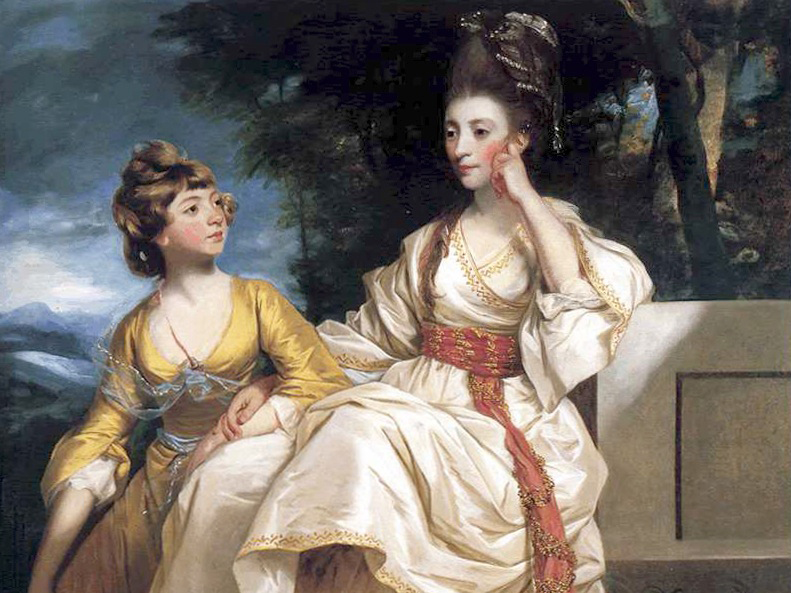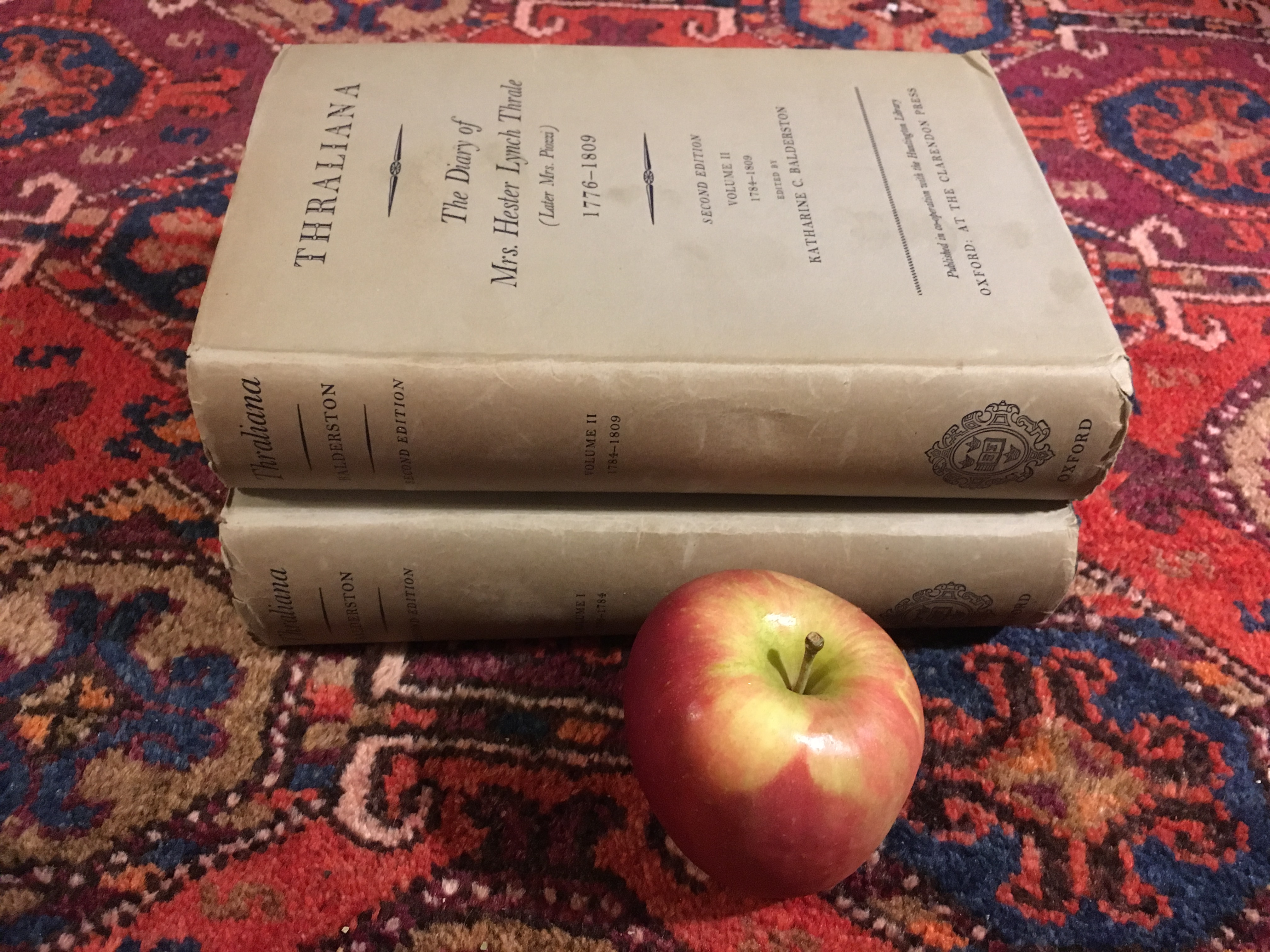【wedding garter eroticism】
A Good Whipping
Our Correspondents
On the “Mrs Thrale” bit in Frank O’Hara’s “Meditations in an Emergency.”

Sir Joshua Reynolds, Hester and Queeney Thrale, 1777–1778.
Frank O’Hara composed the piece that he later called “Meditations in an Emergency” on or around June 25, 1954—anyhow, that is the date on the manuscript. At that time, the title was “Meditations on Re-emergent Occasions,” which makes O’Hara’s debt to John Donne’s 1624 text Devotions Upon Emergent Occasions much more obvious.
O’Hara’s piece, retitled at the suggestion of Kenneth Koch, was published in Poetry about four months later, which is an excellent turn-around time. This was during the five years when Karl Shapiro was editor. You can have a look at the original page layout of “Meditations in an Emergency” here. Clickers who know the text will find no surprises.
The poem—if it’s right to call it that—is full of agreeable variety. The tonal palette runs from mordant Frenchman (“one of these days there’ll be nothing left with which to venture forth”) to Romantic visionary (“Destroy yourself, if you don’t know!”) to gum-snapping Barbara Stanwyck: (“Why don’t you get rid of someone else for a change?”). But, for my much-younger self, entering grad school and hoping to specialize in eighteenth-century British prose stylists, one particular passage exercised a special interest. It’s the only thing in there (it appears twelfth out of thirteen passages) that is a quotation. And what a quotation:
“Fanny Brown is run away—scampered off with a Cornet of Horse; I do love that little Minx, & hope She may be happy, tho’ She has vexed me by this Exploit a little too. —Poor silly Cecchina! or F: B: as we used to call her. —I wish She had a good Whipping and 10,000 pounds.” —Mrs. Thrale.
Now, given the time and place in which I grew up, it’s not surprising I knew O’Hara’s “Meditations” a long time before I had any clue who Mrs. Thrale was. Similarly (and relatedly), I knew Fear and Loathing in Las Vegas for many years before I knew who “Dr. Johnson” was, though I loved the remark by him that serves as that book’s epigraph: “He who makes a beast of himself gets rid of the pain of being a man.”
When I was around thirty, I had come a long way, and put in a happy ninety minutes, trying to find the Thrale bit in Boswell’s Life of Samuel Johnson. It should have been obvious that the Thrale is a diary entry and therefore highly unlikely to appear in Boswell, aside from other objections, but (as so often happens) desire blinded me. There was the lust to find the quote, and there was the lust to diddle at length with the exhaustive index in the Oxford World’s Classics version of Boswell.
I don’t remember at what point I discovered that the passage is from the Thraliana, but I know that when I did discover this, I didn’t really know what the Thraliana was, though I’d heard of it. Yet, the Thraliana is easily explained. Let’s start with its author, Hester Thrale (1741–1821). Any reader of Boswell knows that she was a key member of Johnson’s inner circle. Vivacious, fearless, well-connected—in lots of ways she was the other Boswell. Indeed, she and Boswell were both about the same age (more than thirty years younger than Johnson), both knew him intimately, and both quite clearly got on his nerves. Still, he loved them both, and both wrote about him authoritatively after his death (which occurred on December 13, 1784—just 232 years and a day ago).
In September 1776, Hester Thrale’s husband, Henry, gave her six handsome quarto blank books, leather bound, each with a label stamped with the title Thraliana. They were supposed to serve Hester as commonplace books. She did indeed use them for that, at first very intensely (within four years she had filled the first three books), but later much less so (it took her almost seventeen years to fill the sixth book).
The standard scholarly edition of the Thraliana is still Katharine Balderston’s two-volume Oxford edition, which first appeared in 1942 and was superseded by a second edition in 1951. Here is my copy:

Photo: Nadya Pittendrigh
You can see it’s a monster. And the entries simply record, meticulously and ridiculously, whatever happened to pass through Hester Thrale’s consciousness, from jokes to quotes to late news and weather. For example, here’s what else appears in the same entry as the bit quoted by O’Hara (the entry is dated September 1, 1779):
- News about one British Admiral being replaced by another
- Comments on the last few months’ weather and the plentiful harvest
- A memory of a visit, three years before, from an Italian verse improviser
- A page of quoted Italian, from a Ferrara newspaper, mentioning the improviser’s return to Italy and boast of having met her husband and Johnson and other English worthies
- A mention of the recent death of David Garrick as the probable prompt for the newspaper piece
- A transcript, twelve quatrains, of the supposedly first draft of Alexander Pope’s “Universal Prayer”
- The bit that O’Hara quotes
- A similar, though much less memorable, catty remark on “another flighty Friend whom I love better than She deserves” (a “Mrs Byron”)
In general, the reader should imagine a large Lego structure, say a miniature city, balanced on a platter. Now raise that structure above your head and smash it on the linoleum. Now sit in the rubble and pick up random squares. This is the Thraliana. It’s like “Meditations in an Emergency” for eleven hundred pages. And no emergency.
But here we get into some speculation. Since Frank O’Hara graduated with his M.A. in English from the University of Michigan in 1951, he probably had easy access to the U-M Library when the ’51 Oxford Thraliana came out. Perhaps new library acquisitions were set aside on a special table or shelf? This seems to me the most plausible explanation as to how he would have crossed paths with the paragraph in question.
I venture to doubt O’Hara read the four hundred pages previous to the passage he quotes. My guess is he threw the tome open at random and found, by luck, the delightful nugget. I trust it’s clear why he was attracted to that particular passage? In it, Thrale relishes her own cattiness but is, simultaneously, warm and affectionate. That honest (and honestly petty) manner of processing one’s ambivalence makes Thrale sound a little like the contestants on RuPaul’s Drag Race All Stars. Lovable beings with weaponized personalities. They that have the power to hurt and do none.
If O’Hara did find the passage by chance, it is remarkable that he had the presence of mind to copy it so exactly. ’Cuz I can tell you right now: anyone spotting those sentences, liking them, and then closing the book without further ado would have a devil of a time relocating them. So either he copied them very exactly in the first place or he made note of the page number (it’s volume 1, page 407), or took some other preemptory step. Every scenario seems more or less unlikely. I am somehow unwilling to allow that he might have owned the book.
Meanwhile, it remains for me to provide one footnote. Hester Thrale calls Fanny Brown “poor silly Cecchina.” The word is Italian and should be pronounced tcheh-KEE-nah. In modern Italian, a cecchino is an enemy sniper, but the word acquired that sense in the nineteenth century. Back in 1779, Cecchina was merely the diminutive of Cecca, which is itself short for Francesca. And Fanny is, likewise, a diminutive of Frances, the English equivalent of Francesca. So, Cecchina is basically Fanny in Italian. Little Fanny.
But there’s more. In the same way that the French supposedly call all donkeys Martin, and we supposedly call all cows Bessie, Italians supposedly call all magpies Cecca. Hence the name is sometimes used to denote a silly chattering woman. This also fits our sense of Hester’s attitude toward Fanny Brown. And get this: The English word magpie is actually formed on the same principle. In Middle English, those birds were just called pies. The mag, short for Margaret, got added in the 1500s, when all women were Margaret, in the same way that all American men were Joe in the early twentieth century.
We observe that the present writer has sufficiently exposed his own magpie DNA, and so, to all enemy snipers out there who are about to set to work, he says, heartily: I wish you all a good whipping and a Guggenheim Fellowship.
Anthony Madrid lives in Victoria, Texas. His poems have appeared in Best American Poetry 2013, Boston Review, Fence, Harvard Review, Lana Turner, LIT, andPoetry. His first book is calledI Am Your Slave Now Do What I Say (Canarium Books, 2012). He is a correspondent for the Daily.
Search
Categories
Latest Posts
Should You Quit Your Job To Go Make Video Games?
2025-06-26 20:16What If Technology Actually Helped Writers?
2025-06-26 19:27Google Meet finally gets 1080p video in group calls
2025-06-26 19:12To Die, To Sleep, And Other News
2025-06-26 18:41Amazon Spring Sale 2025: Best Apple AirPods 4 with ANC deal
2025-06-26 18:24Popular Posts
Astronomers saw one galaxy impale another. The damage was an eye
2025-06-26 19:53200+ October Prime Day deals are live right now on Amazon
2025-06-26 19:48What If Technology Actually Helped Writers?
2025-06-26 19:41What's new to streaming this week? (March 7, 2025)
2025-06-26 18:42Featured Posts
Classified Zuma spacecraft may have failed after SpaceX launch
2025-06-26 20:17What social media ads don't tell you about egg freezing
2025-06-26 20:15Insane wildfire photo perfectly sums up America in 2017
2025-06-26 18:49Popular Articles
Pairing CPUs and GPUs: PC Upgrades and Bottlenecking
2025-06-26 20:42Steve Clay on the Beginning of Granary Books
2025-06-26 19:37The Answers to Our Hink Pink Contest
2025-06-26 19:22Online phishing scams and what to look out for
2025-06-26 18:46Hurricane Laura's impact lingered with nightmarish mosquito swarms
2025-06-26 18:23Newsletter
Subscribe to our newsletter for the latest updates.
Comments (848)
Highlight Information Network
Hidden Siri Commands and Unusual Responses
2025-06-26 20:04Wisdom Convergence Information Network
Utah is suing TikTok, claiming it harms children
2025-06-26 19:40Instant Information Network
Klaus Wittkugel, East German Master of Book Design
2025-06-26 18:35Inheritance Information Network
Things People Do: Four Paintings by Mernet Larsen
2025-06-26 18:30Co-creation Information Network
NYT Connections hints and answers for April 14: Tips to solve 'Connections' #673.
2025-06-26 18:10